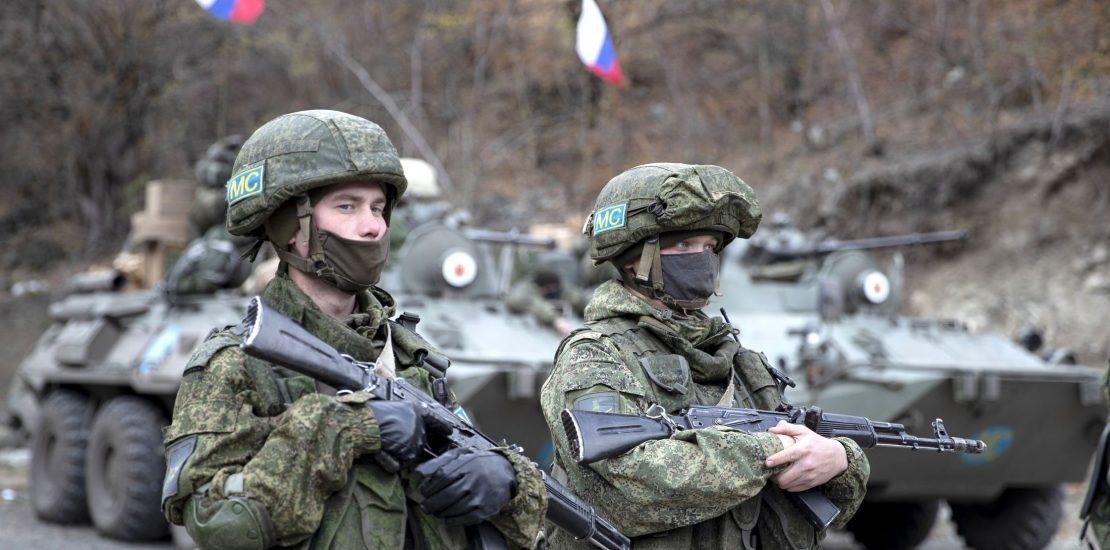- 25 May, 2022
- Foreign Policy

After the trilateral statement of the leaders of Armenia, Russia and Azerbaijan signed on November 10, 2020, Russia, in fact, became the guarantor of the security of the Armenians of Nagorno Karabakh.
According to the statement that ended the 44-day war, the parties to the war remained at the positions they were occupying at the time of signing the statement.
Since November 10, the territories still under the control of Armenian forces (except for the Kelbajar, Lachin and Aghdam districts, which were handed over in the following days) came under the responsibility of Russian peacekeepers.
After November 10, 2020, however, there were cases in both Nagorno Karabakh and Armenia when Russian forces did not intervene in any way in the military aggression of the Azerbaijani side, actually failing to fulfill their function as the guarantor of security.
Nagorno Karabakh
The first case took place shortly after the end of the war, on December 12, 2020, when Azerbaijani forces occupied the Armenian-controlled villages of Khtsaberd and Hin Tagher, which had been under Armenian control as of November 10, killing and capturing Armenian servicemen. The Russian peacekeeping forces did not respond to the Azeri aggression at that time, and a few days later they came to terms with the situation, marking the villages as belonging to the zone of Azerbaijani control on the map of the peacekeeping mission.
However, the aggressive actions of Azerbaijan against the population of Nagorno Karabakh, as well as the military, continued in the future. According to the Prosecutor’s Office of Nagorno Karabakh, from November 10, 2020 to January 1, 2022, 69 crimes were committed against the Armenians of Nagorno Karabakh, including the killing of 3 civilians and 10 servicemen, murder attempts against 77 (50 of them military servicemen) causing bodily injuries of various degrees to 37 people (28 of them military servicemen), physical violence against 8 people, death threats against 2 people.
And in March 2022, a real aggression was launched in the direction of Parukh and Khramort villages of Nagorno Karabakh, as a result of which the village of Parukh was captured, and three people were killed and 14 servicemen were wounded during the clashes. During the same period, the Azeris, in fact, disrupted the gas supply to the whole of Nagorno Karabakh, leaving tens of thousands of residents without heating.
Almost all of these incidents took place in the presence of Russian peacekeepers, but the latter responded only post-factum, merely recording violations.
Armenia
Russia carries out a peacekeeping mission in Nagorno Karabakh and is responsible for the security of the people of Nagorno Karabakh within the framework of that mission, while in the case of Armenia the situation is different.
Armenia and Russia are bound by dozens of bilateral agreements, some of which directly relate to Russia’s role in Armenia’s security.
In particular, according to relevant agreements, the 102nd Russian military base is located in the territory of Armenia, in Gyumri and Sisian, and the Russian border guards are in charge of guarding the Armenian-Turkish and Armenian-Iranian borders. In addition, the 1997 Treaty between the Russian Federation and Armenia on Friendship, Cooperation and Mutual Assistance provides for security, under which, in the event one of the Parties considers that there is a threat of an armed attack, the Parties shall hold consultations on “joint defense and preservation of peace and mutual security”.
However, in addition to bilateral agreements, Armenia is also a member of the Collective Security Treaty Organization. The CSTO is an international security organization, the key player of which is Russia, and in addition to Armenia, Belarus, Kazakhstan, Kyrgyzstan and Tajikistan are also members to it. Russia also has security obligations to Armenia within the framework of this organization, if the latter seeks relevant assistance.
Despite all this, the developments since November 10, 2020 show that Russia and the CSTO are in no hurry to fulfill their responsibilities, to put it mildly, even when Armenia formally requests assistance.
Sotk and Lake Sev
On May 12, 2021, the Azerbaijani armed forces invaded the sovereign territory of the Republic of Armenia, advancing in the Sev Lake region of Syunik Province and Sotk region of Gegharkunik Province.
On May 13, Armenia formally applied to the CSTO in connection with these events to start relevant consultations. However, the CSTO response was non-operational, and after long and lengthy discussions, the organization only concluded that what had happened was a “border dispute” and, hence, beyond the CSTO’s mandate.
Yeraskh
In July, Azerbaijan launched provocations in the Ararat region, Yeraskh, just 50 kilometers from Yerevan. According to the Armenian side, the Azeris tried to advance their positions in the area, the Armenian armed forces retaliated, and active hostilities took place in the area of visibility of Russian units.
Sisian
On November 16, 2021, the Azeris attacked in the direction of Sisian, in the “narrowest” section of the Syunik Province dividing the eastern part of Azerbaijan and the Nakhichevan Autonomous Republic. In order to prevent the advance of the Azerbaijanis, the Armenian side retaliated, and battles broke out, including with the use of artillery. These incidents also took place in the area of direct visibility of Russian units.
In both cases, the Russian troops the latter did not intervene in favor of their allies.
Thus, taking into account the experience since 2020, it can be stated that Russia is not a reliable partner in ensuring security and in fact always maintains neutrality in the face of security challenges facing Armenia. The situation is even more worrying in Nagorno Karabakh, where more than 100 thousand residents live in the area of responsibility of Russian peacekeepers.
Vahe Ghukasyan
Union of Informed Citizens




